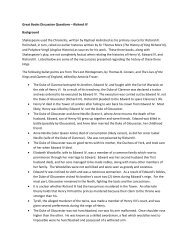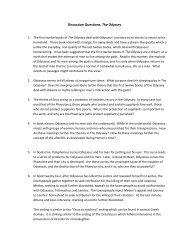1 Wordsworth's Literary Precedents: Derivation and ... - Peter Ponzio
1 Wordsworth's Literary Precedents: Derivation and ... - Peter Ponzio
1 Wordsworth's Literary Precedents: Derivation and ... - Peter Ponzio
Create successful ePaper yourself
Turn your PDF publications into a flip-book with our unique Google optimized e-Paper software.
Wordsworth, in the Essay Supplementary to the Preface of 1815, defined poetry<br />
as a metrical arrangement of the “real language of men in a state of vivid excitement <strong>and</strong><br />
in a manner intended to give pleasure to the reader” (939). He wished to choose<br />
incidents <strong>and</strong> situations from common life, <strong>and</strong> to make these incidents interesting by<br />
“tracing in them, truly though not ostentatiously, the primary laws of our nature” (791).<br />
He believed that the language of rustic men <strong>and</strong> women “has been adopted (purified<br />
indeed from what appear to be its real defects, from all lasting <strong>and</strong> rational causes of<br />
dislike or disgust) because such men hourly communicate with the best objects from<br />
which the best part of language is originally derived” (791). Wordsworth thought that<br />
rustic life provided a moral backdrop that was untainted from vanity <strong>and</strong> social<br />
convention, <strong>and</strong> therefore, that rustic personages spoke “a far more philosophical<br />
language, that than which is frequently substituted for it by Poets” ( 791).<br />
For Wordsworth, poetry was not merely a pleasurable experience shared between<br />
author <strong>and</strong> reader; while he acknowledges that pleasure is one of the aims of poetry, he<br />
believed that good poetry must also have a moral purpose. In one of the most famous<br />
passages from the Preface, Wordsworth notes that reflection is necessary to poetic<br />
construction, <strong>and</strong> that by constantly focusing the mind on important subjects, the poet can<br />
convey his best thoughts to his readers, who will then benefit from them.<br />
For all good poetry is the spontaneous overflow of powerful feelings: <strong>and</strong> though<br />
this be true, Poems to which any value can be attached were never produced on<br />
any variety of subjects but by a man who, being possessed of more than usual<br />
organic sensibility, had also thought long <strong>and</strong> deeply. For our continued influxes<br />
of feeling are modified <strong>and</strong> directed by our thoughts, which are indeed the<br />
representatives of all our past feelings; <strong>and</strong>, as by contemplating the relation of<br />
these general representatives to each other, we discover what is really important<br />
to men, so, by the repetition <strong>and</strong> continuance of this act, our feelings will be<br />
connected with important subjects, till at length, if we be originally possessed of<br />
much sensibility, such habits of mind will be produced, that, by obeying blindly<br />
2




